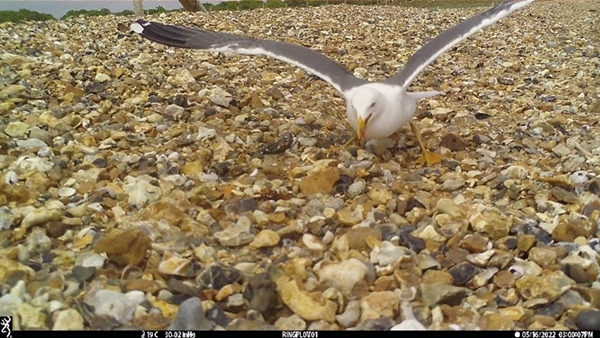Moving into 2023, our ground-nesting birds need your help more than ever.
As you might have read, trail cameras are making a real difference to our understanding of what’s causing nest losses for birds such as curlew, lapwing, and ringed plover.
It starts with the right kit. Some members have emailed to say that there are cheaper camera models available than the ones we currently use, but our scientists have been forensic in their study of what works best for our needs.
For example, our chosen model has a particularly fast-trigger speed so that we don’t miss predation events by gulls, which tend to swoop in and grab eggs or chicks. They have an internal viewfinder, so the camera lens can be rapidly aligned with the nest, allowing the operator to quickly set the camera and leave the area to minimise disturbance to incubating birds.
As trail cameras go, our cameras are particularly small, they’re visually camouflaged, and they emit next to no sound. These varied specifications may seem trivial but we consider them important to minimise the risk of predators detecting cameras, which may alter naturally occurring nest survival outcomes.
This combination of the best technology and expertise is essential to understand what’s happening to these birds.
The results are there to see. Without cameras of this speed, we might miss documenting predation events by gulls, such as this lesser black-backed gull predating a ringed plover nest:

Now that we have developed an effective and proven methodology, we’re keen to do more of this work in 2023, but finding nests, maintaining cameras, and then processing the vast number of images that cameras generate, requires an awful lot of research staff time.
We want to monitor more nests of curlew in the New Forest, ringed plover in the Solent, lapwing on our upland moors and oystercatchers on our Scottish demonstration farm to build a cohesive library of the causes of nest losses of wading birds, across different landscapes and regions of Britain.
Why are we doing this? Like most GWCT research, we want to make a change and to document and showcase what really happens in the natural world. Only then can we develop effective conservation remedies to help turn around the fortunes of our fast-declining but very precious breeding waders.
We’re hoping to raise £5,000 this week to allow us to monitor an additional 30 nests next year. If you can support this vital work, please do so today.
Please help us today >